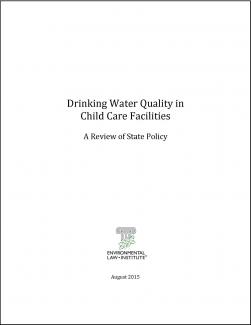
Child care facilities may be served by public water systems or by privately-owned water sources such as wells. These drinking water supplies can be affected by a variety of chemical, biological, and radiological contaminants that occur naturally or are caused by human activities. According to EPA, elevated levels of some drinking water contaminants “have been associated with increased risk of a range of diseases in children, including acute diseases such as gastrointestinal illness, developmental effects such as learning disorders, endocrine disruption, and cancer…Because children tend to take in more water relative to their body weight than adults do, children are likely to have higher exposure to drinking water contaminants.”
This report describes how state laws and regulations address drinking water quality in child care facilities, with a focus on policies addressing water from private wells. The report does not discuss policies governing plumbing fixtures or pipes, nor does it address the siting, construction, and maintenance of wells and other water systems.
Overview of the Report
The report highlights state policies in effect as of 2015 and provides a framework for states to review their policies to identify gaps and opportunities for establishing more health-protective measures in three key areas of state authority.
Drinking Water. Public water systems in the U.S. are regulated under the federal Safe Drinking Water Act. Child care facilities must meet federal standards if they serve a certain number of children, however the SDWA does not include separate requirements for private wells. The report summarizes key SDWA requirements and highlights how some state drinking water laws establish more stringent standards than the federal regime. For example, states may expand the federal definition of public water system or establish drinking water standards and requirements for certain categories of private water systems.
Public Health. The report describes two type of state health regulations governing child care facilities – food service codes and sanitation codes. Nearly all states have food service codes that are based closely on a national model code and that contain requirements related to private water supplies. In some states, the food code requires private water supplies to meet some of the drinking water quality standards that apply to public water systems, and many state food codes require testing of nonpublic water systems at least annually. A small number of states have separate child care health or sanitation regulations that address private water supplies and, in some cases, establish specific requirements for drinking water treatment or testing.
Child Care Licensing. All states have child care licensing rules and, as of 2015, most contained at least some provisions addressing drinking water. In many states, the rules require facilities to provide safe or potable water and to have an “approved” private water source. In some cases, the rules require facilities to comply with certain state drinking water quality standards. Many states include specific water testing requirements, and a small number of states establish response actions to be followed when drinking water hazards are identified at a facility.
Other types of laws not covered here, such as building codes, plumbing codes, and property maintenance codes, may also address drinking water quality in child care facilities.
Though not a focus of this report, lead in drinking water is an important public health issue that gained widespread attention following revelations of lead in the drinking water supply of Flint, Michigan in late 2015. Since then, new federal and state policies and programs have been established to address lead in drinking water, including revisions to EPA’s lead and copper rule under the SDWA.
Explore other materials from ELI’s Indoor Environments Program.
© Environmental Law Institute®